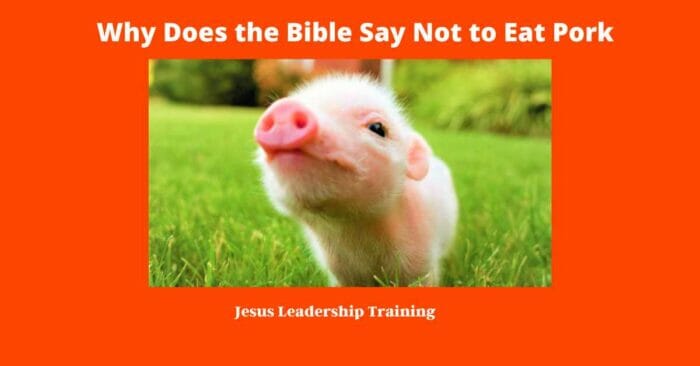Why Does the Bible Say Not to Eat Pork – The Bible contains many dietary restrictions, with the prohibition against eating pork being one of the most well-known. In the Old Testament, Leviticus 11:7-8 states that “And the swine, though he divides the hoof, and be cloven footed, yet he cheweth not the cud; he is unclean to you. Of their flesh
The Old Testament Prohibits it, While the New Testament Does Not. We will examine all aspects of this Question – Smile Greg
Table of Contents
Why Does the Bible Say Not to Eat Pork
The Bible is a collection of ancient books, written by different authors, which make up the Christian scriptures. It is the holy book for Christians and contains the stories, teachings, and laws of the faith. One of the most debated topics in the Bible is dietary laws.
These laws are found in both the Old and New Testaments, and concern which foods are permissible for consumption. In this blog, we will explore what the Bible says about eating pork, and discuss the Biblical reasons for not eating pork.
The Bible has many dietary restrictions and prohibitions that are quite foreign to our modern culture. One of the most well-known of these restrictions is the prohibition against eating pork, or any other pig products. But why does the Bible say not to eat pork?

To answer this question, we must look at what the Bible, both the Old Testament and the New Testament, has to say about pigs and eating pork.
here’s a table providing both biblical and some potential scientific reasons to avoid eating pork:
| Reasons to Avoid Eating Pork | Biblical Basis | Scientific Basis |
|---|---|---|
| Dietary Law | Leviticus 11:7-8, Deuteronomy 14:8 – The Old Testament categorizes the pig as an unclean animal, not suitable for consumption. | Parasites and Diseases – Pigs can carry a range of parasites and diseases that can be transmitted to humans, such as trichinosis, though cooking properly can usually kill these. |
| Symbolic Impurity | In the Bible, pigs are often used symbolically to represent sinful and unclean behavior. | High Fat Content – pork, particularly processed pork products, can be high in unhealthy fats, which can contribute to obesity, heart disease, and other health problems if consumed excessively. |
| Religious Observance | For religious Jews and some Christian sects, not eating pork is a way of observing biblical dietary laws. | Allergies – Some people may have an allergic reaction to pork. |
| Ethical Considerations | Some interpretations of the Bible emphasize respect for animals and creation, which might extend to a critique of modern factory farming methods. | Antibiotic Resistance – Many pigs in factory farms are given antibiotics to promote growth and prevent disease, contributing to the growing problem of antibiotic resistance. |
Remember, the Bible’s dietary laws are interpreted differently among different Christian denominations and individuals. Many Christians believe that the New Testament, particularly Acts 10:9-16, lifts these dietary restrictions.
As for the scientific reasons, while there are potential health risks associated with consuming pork, these risks are common to many types of meat and can usually be mitigated by proper cooking and moderation in consumption. Always refer to trusted health authorities and personal medical professionals for dietary advice.
The Old Testament is very clear about why the Bible says not to eat pork. In Leviticus 11:7-8, it says: “And the pig, though it has a divided hoof, does not chew the cud; it is unclean for you. You must not eat their meat or touch their carcasses; they are unclean for you.”
This passage explicitly states that pigs are considered an unclean animal, and therefore, their meat is prohibited.
But why did God consider pigs to be unclean? Some believe that it is because pigs are scavengers, and so their meat may contain parasites or other contaminants.
Others point out that the pig is the only domesticated animal that does not chew its cud, and so it is considered to be “unnatural” in some way. But whatever the reason, the Bible is clear that we should not eat pork.
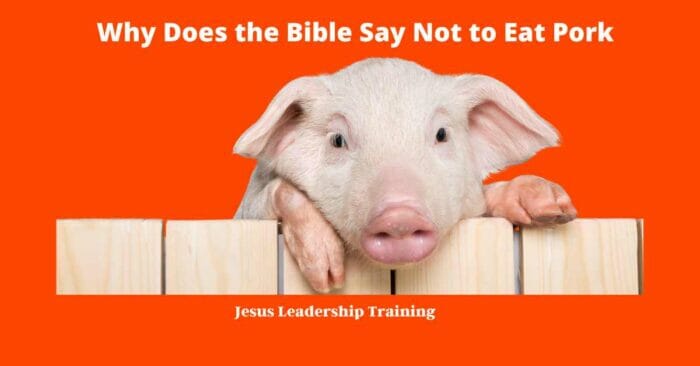
The New Testament does not directly address the issue of eating pork, but there are several passages that deal with how we should treat our bodies. 1 Corinthians 6:19-20 says: “Do you not know that your bodies are temples of the Holy Spirit, who is in you, whom you have received from God?
You are not your own; you were bought at a price. Therefore honor God with your bodies.” This passage implies that we should not do anything that would be detrimental to our bodies, and this would include eating pork, which may contain parasites and other contaminants.
So why do Christians eat pork, if the Bible says not to? The answer is that, while the Bible clearly prohibits the eating of pork, the New Testament does not. Therefore, many Christians believe that eating pork is not wrong.
They point out that Jesus himself ate pork, and that the Bible never explicitly states that Christians should not eat pork. However, they also recognize that pork may contain contaminants and parasites, and that it is a kind of “unclean” animal. As such, they suggest that a weak person should not eat pork, as it may be detrimental to their health.
In conclusion, the Bible does indeed say not to eat pork, as it is considered an unclean animal. But why does the Bible say not to eat pork? The answer is because pork may contain parasites and other contaminants, and is therefore not beneficial to our health.
However, the New Testament does not explicitly state that Christians should not eat pork, and so many Christians believe that eating pork is not wrong. Ultimately, it is up to each individual to decide for themselves whether or not they should eat pork.
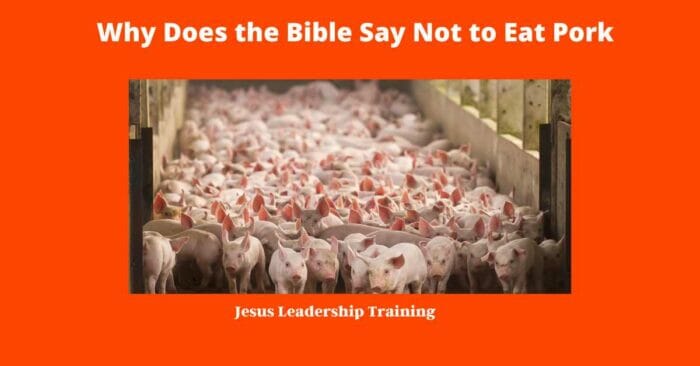
What Does the Old Testament Bible Say About Eating Pork?
The Old Testament Bible is filled with dietary laws, and eating pork is specifically forbidden. Leviticus 11:7-8 states, “And the swine, though he divides the hoof, and be cloven-footed, yet he cheweth not the cud; he is unclean to you.
Of their flesh shall ye not eat, and their carcass shall ye not touch; they are unclean to you.” This verse outlines God’s law against eating pork, and it is reiterated in Deuteronomy 14:8.
- Leviticus 11:7-8 – “And the swine, though he divide the hoof, and be clovenfooted, yet he cheweth not the cud; he is unclean to you. Of their flesh shall ye not eat, and their carcase shall ye not touch; they are unclean to you.” This passage explains that God considers pork unclean and states that it is not to be eaten.
- Deuteronomy 14:8 – “And the swine, because it divideth the hoof, yet cheweth not the cud, it is unclean unto you: ye shall not eat of their flesh, nor touch their dead carcase.” This verse reiterates the prohibition against eating pork that was given in Leviticus.
- Isaiah 65:4 – “Which remain among the graves, and lodge in the monuments, which eat swine’s flesh, and broth of abominable things is in their vessels.” This verse speaks of people who are condemned for their sins, including their consumption of pork.
- Isaiah 66:17 – “They that sanctify themselves, and purify themselves in the gardens behind one tree in the midst, eating swine’s flesh, and the abomination, and the mouse, shall be consumed together, saith the LORD.” This verse speaks of people who will be judged for their sin of eating pork.
- Jeremiah 16:18 – “And first I will recompense their iniquity and their sin double; because they have defiled my land, they have filled mine inheritance with the carcases of their detestable and abominable things.” This verse speaks of the consequences that will follow those who eat pork, which God regards as an abomination.
What Does the New Testament Bible Say About Eating Pork?
The New Testament Bible does not contain any explicit laws forbidding the consumption of pork. However, Jesus did make comments about diet and food that can be interpreted as a warning against eating pork, such as in Mark 7:18-19, where he states,
“And he said unto them, Are ye so without understanding also? Do ye not perceive, that whatsoever thing from without entereth into the man, it cannot defile him.” This statement can be seen as a warning against consuming foods that are considered unclean, such as pork.
- Acts 10:15 – “And a voice came to him: ‘Rise, Peter; kill and eat.’” This verse is from the vision Peter had when he was instructed by God to go to Cornelius’ house and preach the gospel to him and his household. This showed Peter that God had changed the dietary laws and that it was now permissible to eat unclean foods.
- Romans 14:14 – “I know and am persuaded in the Lord Jesus that nothing is unclean in itself, but it is unclean for anyone who thinks it unclean.” This verse shows that what is unclean is a matter of personal conviction, rather than a law from God.
- 1 Corinthians 8:8 – “Food will not commend us to God. We are no worse off if we do not eat, and no better off if we do.” This verse shows that what we eat does not make us more or less righteous in the eyes of God.
- 1 Timothy 4:3-5 – “They forbid marriage and require abstinence from foods that God created to be received with thanksgiving by those who believe and know the truth. For everything created by God is good, and nothing is to be rejected if it is received with thanksgiving, for it is made holy by the word of God and prayer.” This passage shows that food that God created is to be received with thanksgiving and that it is holy if it is accepted with thanksgiving and prayer.
- Hebrews 13:9 – “Do not be led away by diverse and strange teachings, for it is good for the heart to be strengthened by grace, not by foods, which have not benefited those devoted to them.” This verse shows that it is not necessary to abstain from certain foods in order to be strengthened by grace.
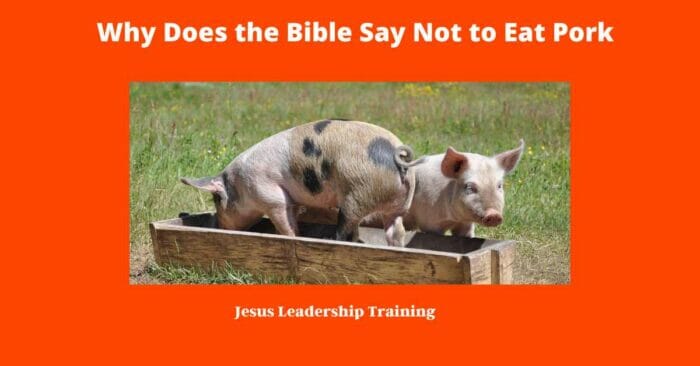
23 Foods – What are the Unclean Food Items in the Bible?
In addition to pork, the Bible lists a variety of other “unclean” food items that should not be eaten. These include shellfish, certain types of fish, rodents, and most insects. The book of Leviticus contains a comprehensive list of all the unclean food items that are forbidden, and it is important for Christians to be aware of these.
- Pigs and pork products
- Shellfish and crustaceans
- Birds of prey
- Most fish (with some exceptions, such as salmon and tuna)
- Reptiles and amphibians
- Insects (with some exceptions, such as locusts)
- Blood and blood products
- Meat from an animal that was not slaughtered according to Jewish laws
- Animals that died of natural causes
- Animals that were not slaughtered humanely
- Mixtures of meat and dairy products
- Non-kosher wines and other alcoholic beverages
- Non-kosher fats and oils
- Non-kosher cheeses
- Non-kosher breads and other baked goods
- Non-kosher seasonings and flavorings
- Non-kosher spices and condiments
- Non-kosher meats or poultry
- Non-kosher fish
- Non-kosher eggs
- Non-kosher dairy products
- Non-kosher food served in a non-kosher restaurant
- Non-kosher utensils, dishes, or cookware
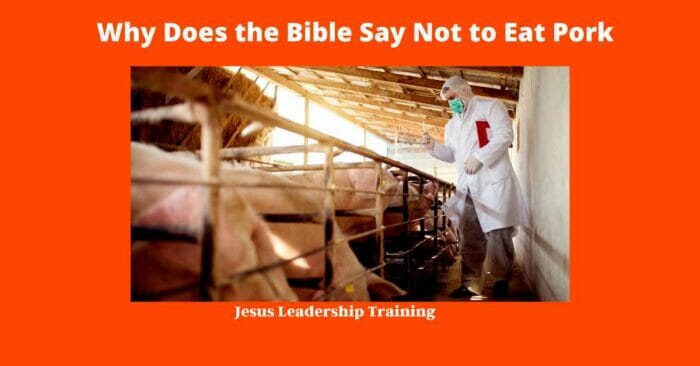
What is the Biblical Reason for Not Eating Pork?
The main reason why pork is forbidden in the Bible is that it is considered an “unclean” food item. Unclean food items were considered impure and were not to be consumed by God’s people. The Bible also states that pigs are scavengers and are considered to be “unclean” animals. This is why pork is forbidden in the Bible.
What Do Kosher and Non-Kosher Mean
Kosher and non-kosher are terms used to refer to food that is prepared and eaten according to Jewish religious dietary laws. Kosher food is food that has been prepared in accordance with Jewish religious dietary laws, known as kashrut.
These laws are based on the teachings of the Torah and the Talmud, which include a variety of dietary restrictions. Non-kosher food, on the other hand, refers to any food that does not meet the requirements of Jewish dietary laws. The primary difference between kosher and non-kosher food is the presence of certain ingredients, such as pork, shellfish, and certain types of fat.
In addition, food that is kosher must be prepared in a certain way, as well as come from a reputable source. While some non-Jewish people may choose to follow certain kosher dietary laws, most of the time, the term ‘kosher’ is used to describe food that is prepared according to Jewish dietary laws.
How Kosher Foods Are Prepared: A Comprehensive Guide
| Category | Kosher Guidelines |
|---|---|
| Animals | – Must have split hooves and chew cud (e.g., cows, sheep). – Must be slaughtered humanely by a trained professional, known as a “shochet”. – Blood must be fully drained from veins. |
| Fowl/Poultry | – Certain birds are prohibited, like predators or scavengers. – Must be slaughtered in the same humane manner as animals. |
| Fish | – Must have fins and scales. – Shellfish and seafood without fins or scales are not kosher. |
| Dairy | – Only milk from kosher animals is acceptable. – Dairy cannot be mixed with meat in meals, cooking, or serving. |
| Eggs | – Must be from kosher birds. – Eggs should not contain any blood spots. If they do, they’re not kosher. |
| Produce (Fruits & Vegetables) | – Must be free from bugs and insects, as these are not kosher. Produce should be thoroughly inspected and washed. |
| Bread & Grains | – Should not contain any non-kosher additives. – During Passover, leavened grains (chametz) like wheat, barley, rye, oats, and spelt are prohibited. |
| Wine & Grape Juice | – Must be produced by Jewish individuals and under strict rabbinical supervision. |
| Meat & Dairy Separation | – Separate utensils, dishes, cookware, and preparation areas should be maintained. – After eating meat, one must wait a specified period before consuming dairy. |
| Processing & Manufacturing | – Any facility producing kosher food must undergo regular inspections by rabbis to ensure compliance. – Equipment used must be exclusively for kosher food or properly kashered (ritually cleaned). |
Note: The preparation and consumption of kosher foods involve a complex set of laws and traditions known as kashrut. This table provides a basic overview, but there are many nuances and specifics that observant Jews follow. Always consult a knowledgeable authority or rabbi for detailed guidance on kashrut.
What Was Apostle Peter’s Dietary Background?
Apostle Peter was a Jewish man and was therefore subject to the dietary laws of the Jewish faith. As a result, he would have been familiar with the laws against eating pork. He would have known that eating pork was forbidden and would have been shocked when he was given a vision from God that instructed him to eat unclean animals.
What Was the Meaning of Peter’s Vision of Unclean and Clean Animals?
In Acts 10:9-16, Peter has a vision of a large sheet with all kinds of animals, both clean and unclean. The Lord tells Peter to rise, kill, and eat the animals. This vision was intended to show Peter that God’s laws were no longer in effect, and that all foods were now permissible. This was a radical shift from the dietary laws of the Old Testament and Peter was initially hesitant to accept it.
How Did Apostle Peter Interpret God’s Vision?
After receiving the vision, Peter had to make a decision on how to interpret it. He concluded that the vision was a sign from God that the laws of the Old Testament no longer applied, and that all foods were now permissible. This interpretation of the vision was confirmed by the voice of God in Acts 10:15, where God states, “What God hath cleansed, that call not thou common.”
Can Christians Eat Pork According to the Bible?
The answer to this question depends on how one interprets the Bible. Some Christians believe that the dietary laws of the Old Testament are still applicable and that eating pork is forbidden. Other Christians believe that the vision of Peter was a sign from God that all foods are now permissible for consumption. Ultimately, it is up to the individual to decide which interpretation to follow.
What Does the Bible Say About What Christians Can Eat? ( Christians Eat)
The Bible does not explicitly state what Christians can and cannot eat. However, there are several passages in the Bible that discuss the dietary laws of the Old Testament and the vision of Peter. These passages can provide guidance on how one should approach dietary laws in the Bible.
What Does the Bible Teach About the Law?
The Bible teaches that the law is important and should be followed. However, it also teaches that the law is not an end in itself, but rather a means to an end. The law is meant to bring us closer to God and to help us live our lives in accordance with his will.
What Did Jesus Say About Eating Pork?
Jesus did not specifically address the issue of eating pork in the Bible. However, it can be inferred from his comments about food that he believed that the dietary laws of the Old Testament should still be followed. For example, in Mark 7:19, he states, “And he said unto them, That which cometh out of the man, that defileth the man.” This statement implies that Jesus believed that certain food items could be considered impure, and should be avoided.
What Other Kinds of Foods Are Forbidden in the Bible?
In addition to pork, the Bible also forbids the consumption of certain other food items, such as shellfish, certain types of fish, rodents, and most insects. The book of Leviticus contains a comprehensive list of all the unclean food items that are forbidden.
What Does the Bible Say About Eating Pork KJV
The Bible has specific passages that deal with the consumption of pork, particularly in the Old Testament. In the King James Version (KJV), the primary references are found in the books of Leviticus and Deuteronomy, which are part of the Mosaic Law. Below is a table summarizing what the Bible says about eating pork in the KJV:
| Bible Passage | Verses | Explanation |
|---|---|---|
| Leviticus 11:7-8 | “And the swine, though he divide the hoof, and be clovenfooted, yet he cheweth not the cud; he is unclean to you. Of their flesh shall ye not eat, and their carcase shall ye not touch; they are unclean to you.” | In this passage, swine (pigs) are described as unclean animals because they do not meet the criteria of chewing the cud and having a divided hoof. Therefore, eating their flesh or touching their carcass is prohibited. |
| Deuteronomy 14:8 | “And the swine, because it divideth the hoof, yet cheweth not the cud, it is unclean unto you: ye shall not eat of their flesh, nor touch their dead carcase.” | This passage reiterates the prohibition found in Leviticus. Swine are deemed unclean and are not to be consumed or touched. |
It’s important to note that these prohibitions are part of the Mosaic Law, which is generally considered to be applicable to the Israelites and not directly applicable to Christians, according to mainstream Christian theology. Acts 10:9-16 and Romans 14:14, for instance, suggest a New Testament perspective that does not strictly forbid the consumption of pork. Nonetheless, some Christian denominations and other religious groups adhere to dietary laws that prohibit pork.
Final Thoughts – Why Does the Bible Say Not to Eat Pork
The Bible contains dietary laws that forbid the consumption of pork. These laws are found in both the Old and New Testaments. In the Old Testament, the Levitical code specifically forbids eating pork, while in the New Testament, Jesus’ comments on food can be interpreted as a warning against eating pork.
The main reason why pork is forbidden in the Bible is that it is considered an “unclean” food item. Apostle Peter’s vision of unclean and clean animals was intended to show him that God’s laws were no longer in effect and that all foods were now permissible. Ultimately, it is up to the individual to decide whether to follow the dietary laws of the Old Testament or the vision of Peter. In addition to pork, the Bible also forbids the consumption of certain other food items, such as shellfish, certain types of fish, rodents, and most insects.



